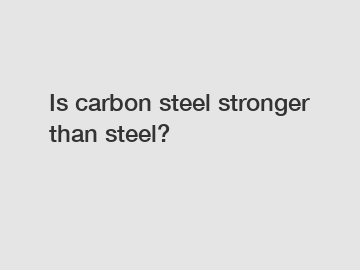Is carbon steel stronger than steel?
Carbon steel and steel are two common materials used in various industries for manufacturing a wide range of products. Both materials have their own unique properties and strengths. One common question that arises is whether carbon steel is stronger than steel. In this article, we will explore the differences between carbon steel and steel and determine which one is stronger.
**Carbon Steel vs. Steel**.
Steel is an alloy of iron and carbon, with carbon content typically ranging between 0.2% and 2.1%. Carbon steel, on the other hand, is a specific type of steel that has higher carbon content than regular steel. The increased carbon content in carbon steel enhances its strength and hardness, making it ideal for applications that require high tensile strength and durability.

**Strength and Durability**.
When it comes to strength and durability, carbon steel is generally considered to be stronger than regular steel. The higher carbon content in carbon steel increases its hardness and strength, making it more resistant to deformation and wear. This makes carbon steel an ideal choice for applications that require high tensile strength, such as in the manufacturing of tools, machinery, and construction materials.
**Tensile Strength**.
Tensile strength is an important factor to consider when comparing the strength of carbon steel and steel. Tensile strength refers to the maximum amount of force a material can withstand before breaking or deforming. Carbon steel typically has higher tensile strength than regular steel due to its higher carbon content. This makes carbon steel a preferred choice for applications that require materials with high tensile strength, such as in the automotive and aerospace industries.
**Impact Strength**.
Impact strength is another important factor to consider when evaluating the strength of carbon steel and steel. Impact strength refers to the ability of a material to withstand sudden impacts or shocks without breaking or deforming. Carbon steel is known for its excellent impact strength, thanks to its higher carbon content, which enhances its hardness and toughness. This makes carbon steel a preferred choice for applications that require materials to withstand sudden impacts or shocks, such as in the manufacturing of cutting tools and heavy machinery.
**Corrosion Resistance**.
While carbon steel is stronger than regular steel, it is also more susceptible to corrosion. Carbon steel is prone to rust and oxidation when exposed to moisture or harsh environmental conditions. Regular steel, on the other hand, is more resistant to corrosion due to its lower carbon content. This makes regular steel a better choice for applications that require materials to withstand corrosion, such as in the construction of buildings and bridges.
**Conclusion**.
In conclusion, carbon steel is generally considered to be stronger than regular steel due to its higher carbon content, which enhances its hardness, strength, and toughness. Carbon steel is preferred for applications that require high tensile strength, impact strength, and durability. However, regular steel is more resistant to corrosion, making it a better choice for applications that require materials to withstand rust and oxidation. Ultimately, the choice between carbon steel and steel depends on the specific requirements of the application.
In summary, carbon steel is stronger than steel in terms of tensile strength, impact strength, and durability. However, steel is more resistant to corrosion. Understanding the differences between these two materials can help in making an informed decision when choosing the right material for a specific application.
If you have any further questions or would like more information on carbon steel and steel, please feel free to contact us.
Want more information on wholesale commercial bench seats, granite bench with back, wholesale wooden litter bins price? Feel free to contact us.
177
0
0

Comments
All Comments (0)